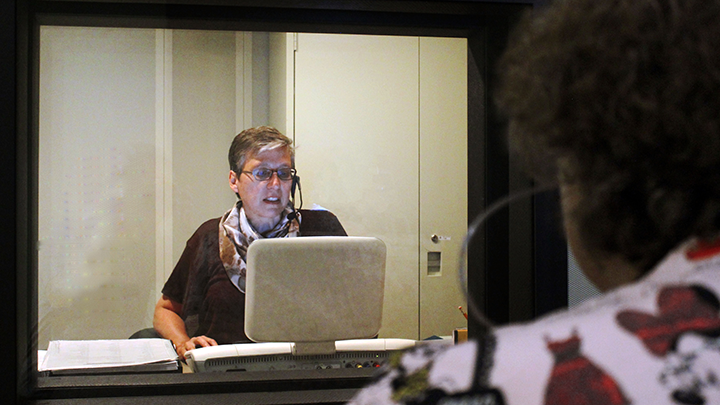
March 10, 2020

Penny Gosselin walks a volunteer through a test to examine their hearing sensitivity and ability to differentiate between sounds.
Story & photo by Patrick Burles
LETHBRIDGE — It started with the little things. A search for the TV remote to boost the volume. Leaning in slightly closer to follow a conversation.
While these may not be red flags for some, they were more than enough for Anne Miller to take notice.
The 73-year-old retired nurse has seen hearing loss progress in loved ones and witnessed the toll it can take. So, when she learned of a research project that aims to measure and examine connections between hearing loss, behaviour and cognitive decline, it was an easy choice to participate.
“Largely, I think my interest was because my mother had a lot of hearing issues, and towards the end of her life she started losing her memory as well, so I’m a little more conscious of it,” says Miller.
The study is being led by Alberta Health Services (AHS) audiologist Penny Gosselin and involves participants in South Zone. Preliminary results from the testing of 35 volunteers between the ages of 60 and 93 have already appeared in a paper — Effect of Hearing Ability and Mild Behavioural Impairment on MoCA (Montreal Cognitive Assessment) and Memory Index Scores, — published in the September 2019 issue of the Canadian Geriatrics Journal.
Through their hearing, behavioural and cognitive testing, Gosselin and her multidisciplinary team found a correlation between hearing ability and impaired cognitive function, as well as greater behavioural burdens for people with hearing loss. These conclusions are also supported by the Public Health Agency of Canada’s Dementia Strategy.
“About 40 per cent of people are going to have hearing loss that's significant enough to affect their day-to-day function when they reach retirement age,” says Gosselin.
“Most people don’t even really notice they have a hearing problem because every day they adapt to their new normal. Little by little, hearing loss can become more taxing because listening takes more effort. They don’t always know why they’re tired after large family gatherings or watching a movie —they just get used to working a little harder to filter sound and pick out words.”
The hearing tests involved with the study are relatively straight-forward, with a focus on hearing sensitivity and differentiating between sounds.
Two of the tests involve listening to a woman’s voice in a crowded room — and then trying to repeat as much of what she said as possible. Another involves participants hearing different numbers in each ear at the same time and then having to report all of them. Behavioural testing is conducted with a 34-item questionnaire called the Mild Behavioural Impairment Checklist, while cognitive tests are administered by occupational therapists.
“In my clinical work, I met someone who was very distraught about their condition. They knew something was changing, but they couldn't identify what it was,” adds Gosselin. “Our testing showed it was very difficult for this person to process speech sounds in challenging listening conditions. Within a short time frame, they experienced rapid cognitive and functional decline.
“With our research, we’ve seen similar trends begin to emerge with our participants as well,” she says. “We hope to keep building evidence to support our observations and learn more about how hearing and behaviour can be predictive of changes to our thinking and remembering over time.”
As for potential applications for this research, Gosselin believes that while we still have a long way to go to fully understand the links, anything that gives people an early warning sign for possible health issues is an important step forward.
“We know that when hearing loss is identified with kids and babies, the earlier we intervene, the better for developing their speech and language skills,” adds Gosselin.
“For older adults, identifying hearing loss and addressing it at earlier ages, like 50 instead of 75, could potentially also give them a head start on handling possible cognition problems — and preventing things like apathy, social isolation and withdrawal. Examining risk factors and the impact of earlier interventions are important parts of what we’re working to learn.”
As for Miller, she recognizes that this research isn’t likely to benefit her directly. And she’s OK with that.
“You know, it would be nice to just learn a little more. Maybe get a little understanding of what happened to my mother,” says Miller. “We’re all getting older and probably a majority of us are going to be affected. The frustration and isolation slowly builds without you even knowing it. Hearing loss really is insidious,” she says, with just a hint of resignation. But the mood only lasts a moment.
“I have children and grandchildren, and you know, if my contribution can improve their health and well-being in any way, that’s all I really need.”